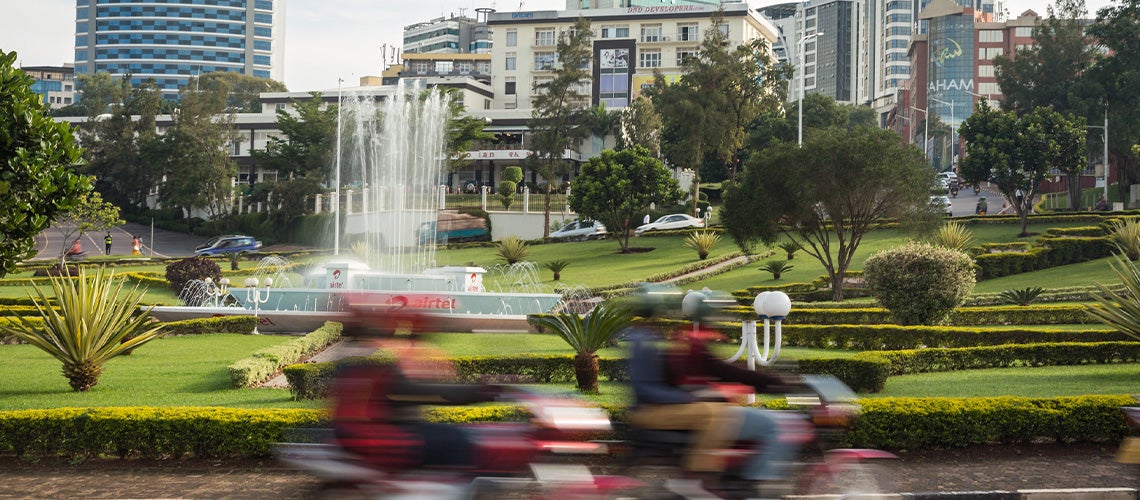 Traffic on a roundabout near Kigali's central business district. Kigali, Rwanda
Traffic on a roundabout near Kigali's central business district. Kigali, Rwanda
The COVID-19 global pandemic has challenged the world in so many ways. While the race for vaccine development and deployment absorbed much of our attention, extended lockdowns transformed our way of working, living, and interacting with others. As we learned how to live with the new contactless dynamics, various industries were finding new mechanisms to cope with the virtual way of operations and to find innovative solutions for business continuity. The disruptions to our daily routines have not only decreased face-to-face interactions, but also impacted the traditional approaches to delivering capacity building, knowledge exchange, and peer-to-peer learning.
The pandemic has underlined that in a highly interconnected and globalized world, disaster risks have become more systemic and their impacts more synchronous. Natural hazards magnify the challenges millions of people face, especially in low- and middle-income countries, caused by fragile systems in electricity grids, water and sanitation systems, and overstrained transport networks. The pandemic has disproportionately affected the most vulnerable population that suffers more the consequences of unreliable infrastructure assets and service delivery. To protect infrastructure and promote resilience in such vital sectors for society’s well-being to raise the quality of life and promote development, knowledge exchange and capacity building cannot be undermined.
In this context, the World Bank Group rapidly transitioned many flagship capacity-building programs to the virtual modality. The Tokyo Development Learning Center (TDLC), in collaboration with the World Bank Tokyo Disaster Risk Management (DRM) Hub/Global Facility for Disaster Reduction and Recovery (GFDRR) through the Japan-World Bank Program for Mainstreaming Disaster Risk Management in Developing Countries, redesigned the popular Technical Deep Dive (TDD) series to fit a remote world. Originally designed as an in-person full-time week of presentations and field visits in Japan, TDDs rapidly attracted Task Teams and Clients’ interest due to relevant and cutting-edge work that the Japanese Government, private sector and communities developed over a century in managing natural hazards and promoting resilience.
The very first Resilient Infrastructure Technical Deep Dive (RITDD), a peer-to-peer learning and dialogue event, was held to leverage Japanese and global expertise toward the development of resilient infrastructure against natural hazards and weather-related disasters across the world. While the virtual TDD prevented the participants from physically conducting site visits in Japan, it allowed a greater number of country delegations to attend highly competitive learning opportunities. The RITDD brought delegations from seven countries (Azerbaijan, China, Jordan, the Maldives, Nigeria, Rwanda, and Tunisia) and over 33 clients and 16 World Bank task team leaders. The RITDD leveraged a record-breaking seven Japan case studies in which Japan’s top experts shared with a global audience how the country developed its multi-hazard and multi-layered approach to monitor natural hazards and mitigate disaster risks. For instance, Japan cases presented the challenges of responding to the 1995 Kobe Earthquake, how civil society, and private and public sectors collaborated to mitigate impacts from the 2011 Great Eastern Japan Earthquake and Tsunami, and how policymaking and government-led management were paramount to sustaining continuous policy development, culminating with the establishment of the National Resilience Promotion Office, among others.
With over 15 hours of content, the RITDD was a multilateral learning event bringing together water, transport, and energy teams and clients. Client reactions, such as the need for Azerbaijan to invest in better disaster risk management protocols, the City of Kigali, Rwanda, to promote more integrated urban resilience investments, and how the Maldives urgently aims to address small population’s exposure to natural hazards and isolation can be seen on these three vlogs.
Related:





Join the Conversation